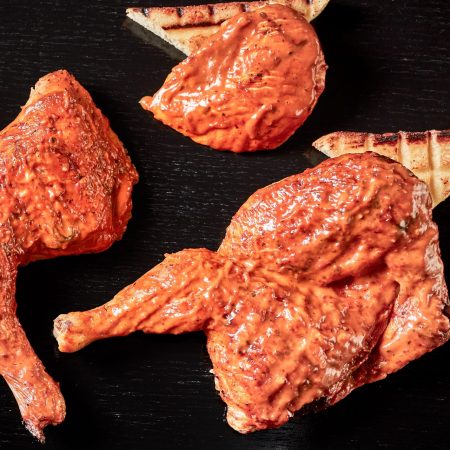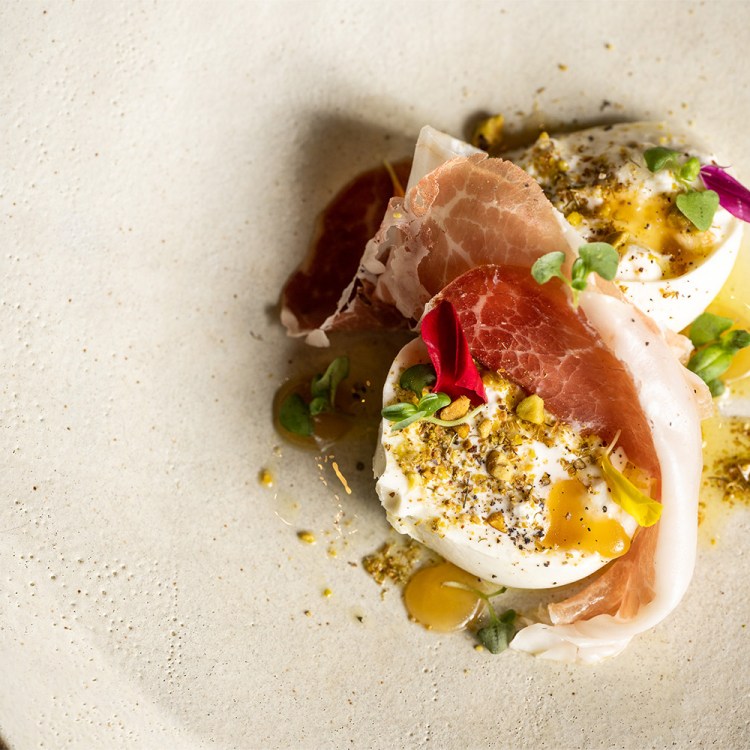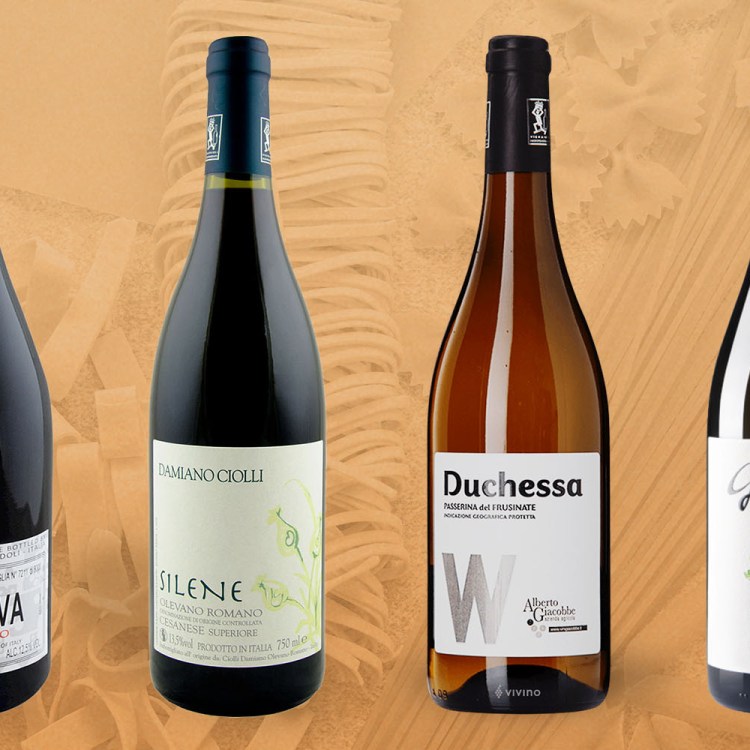Grilling season used to be tough for the meat-averse man. Your options were basically frozen veggie patties, their laboriously handmade alternatives or whatever veggie dogs are made of.
But more and more people are making the choice to go vegan or vegetarian (about 25 percent of those aged 25-34 identify as one or the other, The Atlantic reported), which has prompted an entire industry dedicated to producing higher-quality options. Look no further than Impossible Foods, which is now stocked at Burger King locations across the country and counts Serena Williams and Jay-Z among its investors. The company has raised $750 million in venture funding to date, with a current valuation of $2 billion, according to Reuters.
The success of Impossible has unsurprisingly spawned competition, with an ever-growing list of brands trying to achieve well, the impossible: create a tasty, responsibly sourced and sustainable meat substitute that can convert even the most red-blooded carnivores.
Below, we take a look at six of the biggest players in the space, from “plant-based” burgers to “lab-grown” meat to “blended” options that cut down your intake without eliminating it wholesale.
Plant-Based Meat
You mean veggie burgers? Well, yes, basically. But today’s vegan and veggie “meat” options are a far cry from the Boca burgers of 20 years ago in terms of taste and texture, which is why the companies that make them have opted for a rebrand.
Buyer beware: it might be easy to assume that these burgers are healthy by default, because plants. But one sneaky culprit keeps popping up on many alt-meat ingredients lists that is sabotaging their otherwise squeaky-clean rep: plant oils. More on that below.

Beyond Meat
Where to find it: One of the more readily accessible plant-based burgers out there, the Beyond Burger can be found in grocery stores like Giant, Safeway and Whole Foods, via Amazon Fresh and at restaurants like TGI Fridays, Carl’s Jr. and Bareburger.
What’s in it: The Beyond Burgers don’t contain any GMOs, soy or gluten, a conscious decision the company made to “develop the lowest barrier of entry” to the product for anyone interested in trying it out. “It’s something that’s new for a lot of people and we didn’t want to make it hard for them,” Beyond’s Senior Manager, Communications, Allison Aronoff, tells InsideHook.
How good is it for me? It’s much lower in cholesterol than red meat, has zero trans fat and no sugar at all, and still packs a protein punch with 20 grams per serving thanks to peas. Despite a recent update to their recipe, though, the patties contain coconut oil, which jacks up the fat levels. Each patty is loaded with 6g of saturated fat, or 30 percent of your daily allotment. Despite being plant-based, alternative meat products are heavily processed, and with that comes health risks, too.
How good is it for the world? It’s way better for the environment than an animal-based burger. “The University of Michigan did a life cycle analysis of beef burgers from processing all the way to the grocery store shelf and looked at the same thing for the Beyond Burger and it’s really staggering,” Aronoff says. “We use 99 percent less water, 93 percent less land, 50 percent less energy and produce 90 percent fewer greenhouse emissions.”
Do I want to eat it? Beyond is pretty transparent about how its burgers taste and admits that they’re not 100 percent of the way there yet. “But we’re close,” says Aronoff. “We’ve made nice strides with the latest version but it’s a constant process of innovating and we’ll continue to do so until [beef burgers and the Beyond Burger] are completely indistinguishable,” she adds. “Carnivores don’t want a veggie burger, they want what they have without the downside, so it’s our job to come in and deliver that.”
Other products of note: Beyond also has a ground “beef” product, an original and a spicy sausage and two different flavors of what it calls “crumbles” — what’s basically ground un-meat.

Impossible Foods
Where to find it: The Impossible Burger also features prominently at Bareburger, as well as 5 Napkin Burger, White Castle, Applebee’s and in the form of the Impossible Whopper at Burger King. It is not yet available in grocery stores, however.
What’s in it: The patties are made of a soy and potato protein blend mixed with sunflower oil, another high-fat oil. But what’s unique about the Impossible patty is heme. Heme is an iron ion that’s found in every living thing and is the key ingredient in making something meat-free taste, well, meaty. It also contains pea, mung bean and rice proteins.
How good is it for me? One thing to know about heme — an ingredient most of us probably haven’t even heard of before — is that a lot of people, like the folks at the World Health Organization, are concerned that it is “linked to carcinogens in the gut,” Quartz reported. And again, the fatty oil (in this case, sunflower) means it has a high saturated fat total, with eight grams per serving, or 40 percent of what you should have in a day. It also has nine grams of carbs to the Beyond Burger’s three.
What’s worse for me: Beyond’s coconut oil or Impossible’s sunflower? Coconut oil is basically all saturated fat, something the American Heart Association believes we should be replacing with healthier options to lower the amount of cholesterol in the blood. While our bodies do need a very small amount of saturated fat, the argument that coconut oil is a “superfood” has not been proven by actual science. The sunflower oil used in Impossible’s burger, meanwhile, contains nearly 30 percent of the vitamin E we should have each day and is also high in omega-6 fatty acids, a pro-inflammatory polyunsaturated fatty acid that could promote swelling and bloating.
Do I want to eat it? If the court of public opinion is to be trusted, then yes. The Impossible Burger is so popular that as of June 15, the nation was experiencing a shortage. In a Thrillist side-by-side comparison, Impossible’s “tasted a lot more similar to beef than the Beyond patty,” with a classically charred exterior and pleasantly pink inside.
Lab-Grown Meat
Unlike Beyond and Impossible, lab-grown or “cultured” meat companies make food that isn’t vegan or vegetarian — it’s actual meat. The catch is that it’s not harvested from a once-living, breathing, farm-raised animal, but rather grown out of stem cells in bioreactors. In short, scientists remove cells from chickens or cows, then feed them nutrients in order to reproduce as they would in a growing animal. The cells eventually form into what looks like — and essentially is — ground meat. Sure, there’s a Soylent Green vibe about the whole thing, but it could be a more ethical, sustainable way of supplying future populations with the protein-rich food they crave.

JUST, Inc.
JUST was founded under the name Hampton Creek Foods by social activists Josh Tetrick and Josh Balk, the latter a sitting vice president for the Humane Society of the United States. The company has been producing plant-based egg, cookie dough and mayo substitutes since its founding in 2011, but revealed in 2017 that it had been working on a top-secret foray into the cultured meat space. They plan to unveil a chicken product in the near future before branching out into beef and pork.
How good is it for me? Their exact ingredient lists and nutrition facts are not yet available, which makes it difficult to ascertain how healthy it will be. Experts familiar with the process, however, aren’t yet on board. “There are chemicals used to create that cell culture to make the lab-grown meat,” Dana Perls, a senior food and agriculture campaigner for the environmental advocacy group, Friends of the Earth, told Well + Good. “Each of those inputs must be assessed for safety. We can’t just focus on the final product.”
How good is it for the world? Without a doubt, very, very, incredibly good. Sustainability is the cultured meat industry’s one undeniable boon. The elimination of slaughterhouses means using less electricity and water, therefore producing fewer pollutants that harm air and atmospheric quality. “At current rates, production of meat and seafood around the world will double to 1.2 trillion pounds by 2050,” JUST claims on its site. “Our planet cannot afford to supply the water, fuel, pesticides and fertilizer that industrialized animal production requires. It can’t afford the polluted water or the biodiversity loss. It can’t afford the moral inconsistencies.”
Do I want to eat it? That’s the question, isn’t it? It’s meat that was created via stem-cell technology in a lab. Then, the first prehistoric human who ate a four-legged mammal probably had to deal with a friend skeptically grunting, “You sure you wanna eat that?” It’s your call, but science seems cautious.

Aleph Farms
In an effort to get its lab-grown beef steaks onto the market within the next four years, Aleph Farms recently raised $12 million — a potential sign that at least some cagey investors believe in the future of lab-grown meat. The company is putting that money towards creating a commercial-sized “bio-farm,” which Labiotech describes as similar to the setup dairy plants use.
How much will a sci-fi steak run me, anyway? Aleph appears to be positioning itself at the premium end of the alternative-meat spectrum, or “to dinner what Tesla Inc. is to cars,” as The Wall Street Journal describes it. It currently costs them around $50 to produce a single steak.
“We don’t want to go for low-range, low-cost, low-price product,” Aleph Farms’ chief executive Didier Toubia told the Journal. Toubia also said that he believes the brand’s products could pop up on restaurant menus as early as 2021 and in “retail stores” by 2023. He added that prices will likely go down over time as the cost to create the steaks lowers, but not too far down. “There’s no reason we shouldn’t feel comfortable selling our products at a certain premium,” he said.
Blended Meat
Blended meat is exactly what it sounds like: part meat, part vegetable. It’s also where two of the biggest players in the game — industry titans Tyson and Perdue — have decided to push their chips. Don’t go looking for them just yet: the companies announced their new endeavors within a day of one another earlier this month, meaning the products haven’t hit grocery store shelves yet.
The idea behind blended meat is that it’s a more healthy alternative to regular meat for those who aren’t ready or willing to go full veg. But while a blended meat option might check the box for consumers concerned with health, it obviously doesn’t have the environmental or social impact its lab-grown or plant-based competitors do.

Tyson
Tyson’s 50-percent ground beef, 50-percent plant-based products will be sold under its new “Raised & Rooted” banner, a move that might be the company’s way of separating its two divisions — all meat and part meat — from one another. “We’re expanding our position as a global protein leader to meet growing demand for plant-based protein with our new Raised & Rooted plant-based nuggets and blended patties,” Tyson tweeted earlier this month. “We’re #RaisingExpectations for just how good plant protein can taste.” The announcement came just a month after the company sold off its stake in Beyond Meat; the product is expected to premiere this summer.
What’s in it, exactly? Tyson’s “flexitarian” approach will incorporate meat and pea protein to make up the brand’s new nuggets, while a mixture of hormone-free chicken, chickpeas, lentils, black beans, quinoa and barley will contribute to the pre-cooked chicken sausage links and meatballs made by Aidell’s Whole Blends, also a Tyson-owned company.
How good is it for me? The inclusion of plants will make Raise & Rooted products healthier than 100-percent meats, the overconsumption of which has been linked with obesity, cancer … the works. Burgers made with blended meat tend to have fewer calories, carbs and grams of fat, according to Mic, and they’ve already been added to the cafeteria menus at Yale and Harvard. If it’s good enough for those pinky raisers, it’s probably good enough for the rest of us.

Perdue Farms
Perdue reached out to Sacramento-based startup The Better Meat Co. when it decided to produce blended meat chicken nuggets and patties, combining its industry knowhow with an emerging brand in the plant-based world.
What’s in it? Perdue announced in mid June that they will begin selling frozen chicken nuggets mixed with cauliflower, chickpeas and a plant-based protein beginning this September, with more to come soon after.
Who’s the target audience here? “Consumers have told us the vegetarian lifestyle is too hard, but they’re looking for ways to introduce more vegetables into their diet,” Perdue’s chief marketing officer, Eric Christianson, said amid the announcement. Another benefit of blended meats is the ease with which parents will be able to trick their children into eating more vegetables. “[They’ll be] like Trojan horses made of vegetables making it onto kids’ plates and into their stomachs,” added Christianson.
We’ll see about that.
This article was featured in the InsideHook newsletter. Sign up now.






















